The Dinengdeng Festival is an annual celebration in Ilocos Norte, Philippines, honoring the Ilocano dish Dinengdeng. It showcases local culture, cuisine, and agricultural produce.
Recognized for its vibrant display of tradition and tastes, the Dinengdeng Festival brings together residents and tourists every May. This cultural event celebrates the simplicity and richness of Ilocano culinary heritage through the cooking of Dinengdeng, a vegetable stew made with bagoong (fermented fish sauce).
Visitors immerse themselves in a festive atmosphere filled with colorful parades, cooking competitions, and dance performances. The festival not only highlights the importance of agricultural sustainability but also fosters community pride. As tourists indulge in the unique flavors of the region, they also contribute to supporting local farmers and producers, integral players in preserving the Ilocano way of life.
History Of Dinengdeng Festival
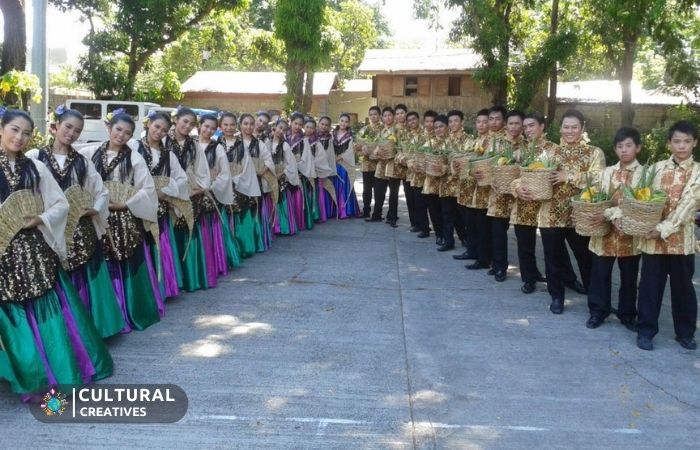
The Dinengdeng Festival emerges as an epicurean spectacle that celebrates the rich flavors and cultural heritage of Ilocos. It’s a vibrant homage to an iconic dish that has become synonymous with Ilocano identity. This festival is not just a feast for the taste buds but a stirring experience that encapsulates tradition, community, and the bountiful harvest of the region.
Exploring The Roots Of Dinengdeng
Dinengdeng, also known as Inabraw, is more than just a dish; it’s a story of survival, innovation, and the Ilocano spirit. The roots of this beloved stew date back to the pre-colonial Philippines, serving as a testament to the resourcefulness of the locals. Utilizing simple ingredients from their backyard and the river, the Ilocanos created a dish that reflects their connection to the land and water.
Dinengdeng: A Staple Of Ilocano Cuisine
At the heart of Ilocano cuisine, Dinengdeng stands out with its unique blend of local greens, grilled fish, and fermented fish sauce known as bagoong. This staple dish is a perfect example of the region’s culinary philosophy: fresh, flavorful, and unpretentious. It’s a versatile recipe that sees countless variations, each family adding their touch to this well-loved concoction.
- Simple, yet nutritious ingredients
- Rich in flavors and textures
- Reflective of Ilocano frugality and practicality
The Annual Celebration: Setting The Scene For The Festival
As the season of harvest unfolds, the Dinengdeng Festival takes center stage in the province. Streets bustle with anticipation as locals and visitors alike gather to celebrate the Ilocano culinary masterpiece. Imaginative bamboo decorations and colorful buntings adorn the locale, setting a festive backdrop for the activities. The air fills with savory aromas, leading into a day filled with cooking competitions, cultural performances, and a grand communal feast.
| Date | Event Highlights | Special Attractions |
|---|---|---|
| Mid-Year Harvest | Cook-off Challenges | Local Craft Displays |
| Annual Celebration | Folk Dance Routines | Culinary Exhibits |
| Community Gathering | Parade of Floats | Interactive Workshops |
The Cultural Significance Of Dinengdeng
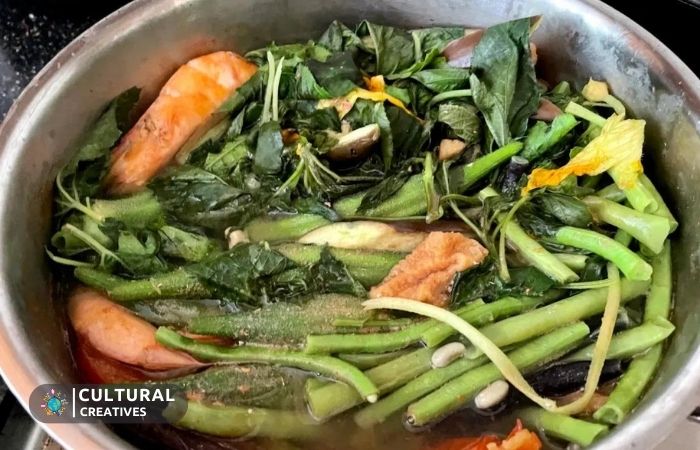
Ilocos, a region known for its rich culture and flavorful cuisine, proudly celebrates the Dinengdeng Festival. This event underscores not only the joy of a communal feast but delves into profound traditions that are vital to its people. Emphasizing its importance, Dinengdeng, a humble yet tasteful vegetable stew, becomes a vibrant symbol of the region’s history, community, and way of life.
Dinengdeng As An Emblem Of Ilocano Heritage
Among the Ilocanos, Dinengdeng is far more than a simple dish. It’s a culinary hallmark that’s woven deeply into their identity. The Festival provides a platform for a vivid re-enactment of Ilocano culinary traditions, showcasing the intricate preparations handed down through generations. For visitors, it’s an opportunity to peek into a culture that thrives on simplicity, ingenuity, and a deep-seated respect for land and produce.
Agricultural Ties: Celebration Of Harvest
The Dinengdeng Festival coincides with the bountiful harvest season, turning it into a celebration of agricultural heritage. Fresh, locally-grown vegetables take center stage, celebrating the farmers’ dedication. Every bowl served is a testament to the fertile lands of Ilocos and the tireless work ethic of its people. The festival’s vibrant energy captivates everyone, making it a memorable homage to an agrarian way of life.
Preserving Traditions Through Culinary Practices
The festival is a gustatory journey that also serves as a form of cultural preservation. Preparing and sharing Dinengdeng solidifies community bonds and ensures the continuity of Ilocano culinary artistry. Each pot of stew simmered is a narrative of the past, ingraining respect for traditional methods in the modern palate. It’s a hearty reminder of the importance of safeguarding ancestral practices through the universal language of food.
Festival Highlights
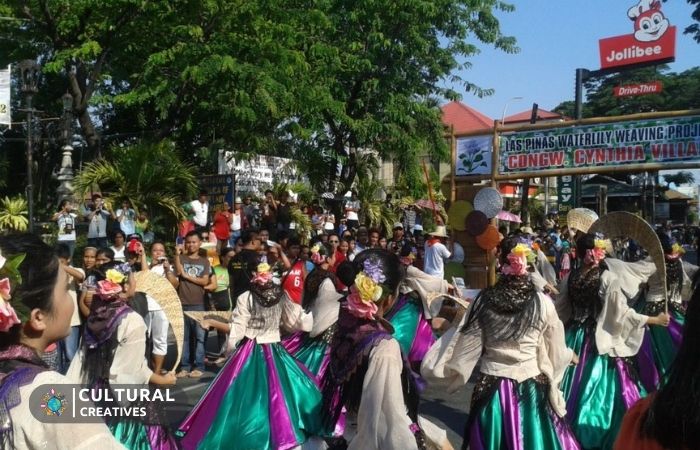
The Dinengdeng Festival, named after the beloved Ilocano dish, is not just a gastronomic celebration but a vibrant tapestry of culture and camaraderie. Each year, locals and travelers alike descend upon the grounds with great anticipation for the unforgettable blend of flavors, colors, and experiences that define the event. Let’s dive into the festival highlights that make this occasion an absolute must-see.
The Grand Dinengdeng Cook-off: A Culinary Competition
At the heart of the festival lies the fierce yet friendly Grand Dinengdeng Cook-Off. This culinary showdown invites talented chefs and enthusiastic locals to whip up their unique takes on the classic dish. Judges and festival-goers alike are treated to an array of Dinengdeng variations, showcasing creativity and tradition all in one bite.
- Regional Ingredients: Discover the rich produce and unique flavors of the region.
- Cooking Skills: Witness the impressive techniques and secrets of Dinengdeng preparation.
- Prizes: Competitors vie for the coveted title of Dinengdeng Champion, with awards for taste, originality, and presentation.
Cultural Performances And Folk Dances
The festival also serves as a stage for awe-inspiring cultural performances. Dancers adorned in colorful costumes take to the streets, moving to the rhythm of Ilocano heritage. Each performance tells a story, embodying the spirit and history of the Philippines and its festivals.
Highlights include:
- Tadek: A traditional romantic dance that symbolizes courtship and love.
- Kannaway: A demonstration of daily life and labor, often featuring props like baskets and fishing nets.
- Pandanggo: A dance of balance and grace, with performers holding candles or lamps.
Interactive Workshops And Cooking Demonstrations
True to the educational spirit of the Dinengdeng Festival, several interactive workshops and cooking demonstrations are set up throughout the venue. These sessions are perfect opportunities for hands-on learning and mingling with experts.
| Workshop/Demo | Description | Duration |
|---|---|---|
| Heritage Cooking | Master the art of traditional Ilocano dishes beyond Dinengdeng. | 1 Hour |
| Vegetable Carving | Learn the decorative art of vegetable carving to beautify your meals. | 30 Minutes |
| Local Farming Techniques | Discover sustainable farming methods practiced in Ilocos. | 45 Minutes |
Each workshop offers valuable insights and practical tips, ensuring participants leave with both knowledge and fond memories.
Experiencing The Flavors Of Dinengdeng
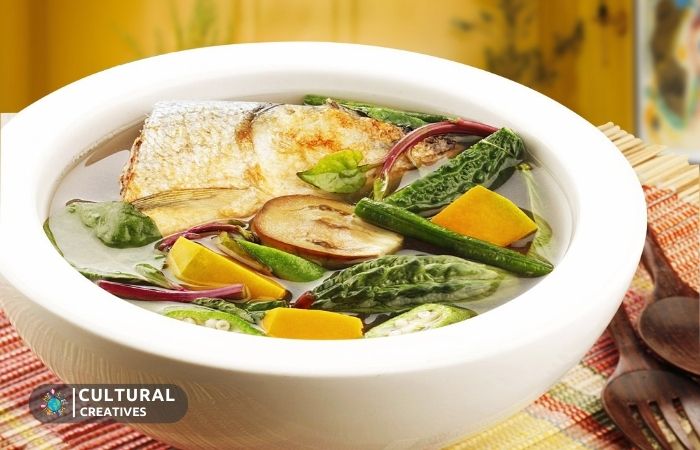
This delectable event is not just about tasting food; it’s about embracing a culture and understanding the heritage behind one of the Philippines’ beloved dishes, Dinengdeng.
The Ingredients And Techniques Defining Dinengdeng
Discover the quintessence of Dinengdeng with its vibrant array of ingredients and time-honored cooking techniques. Let’s unravel the components that make this dish uniquely Ilocano.
- Vegetables: From string beans and okra to squash and bitter gourd, freshness is key.
- Grilled Fish: This staple protein adds a smoky flavor, merging seamlessly with the vegetables.
- Bagoong: This fermented fish sauce is the flavor backbone, imparting a rich umami taste.
Through boiling and sautéing, each ingredient melds together, creating a harmonious blend that is both hearty and healthy.
Tasting Sessions: Savoring A Myriad Of Regional Variants
No two Dinengdeng dishes are the same. Each cook brings their personal touch to the table, influenced by their region’s produce and traditions. As you wander through the festival, find joy in the diversity of flavors:
- Buridibud: A variant with sweet potato and legumes.
- Inabraw: A more brothy concoction.
- Simple backyard Dinengdeng: Crafted with whatever greenery is on hand.
Pairings And Complements: A Full Ilocano Meal
Embark on a journey of pairing and complementing dishes to enhance your Dinengdeng experience. Here’s how the locals do it:
| Ilocano Dish | Pairing Suggestion |
|---|---|
| Grilled Bangus (Milkfish) | Perfect with the smokey notes of Dinengdeng. |
| Inihaw na Liempo (Grilled Pork Belly) | Complements with its rich, savory flavor. |
| Bagnet (Crispy Pork) | Provides a delightful textural contrast. |
Pair your bowl of Dinengdeng with rice for a truly satisfying Ilocano meal, and don’t miss the chance to taste the local sugarcane vinegar as a dip or dressing.
Impacts And Benefits Of The Festival
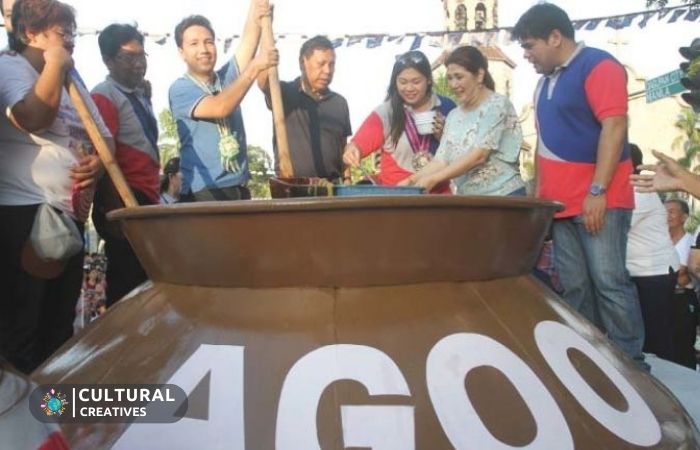
The Dinengdeng Festival, a vibrant and culturally rich celebration, not only honors culinary heritage but also creates significant impacts and benefits for its local community. This festive occasion, deeply rooted in tradition, has far-reaching effects that extend beyond mere entertainment, carving out a meaningful footprint in various sectors of society.
Boosting Local Tourism And Economy
The Dinengdeng Festival acts as a catalyst for local tourism, drawing visitors from across the nation and even international spheres. The influx of festival-goers provides an impressive boost to the local economy, with businesses witnessing a substantial uptick in revenues.
- Hotels and accommodations often reach full capacity
- Local artisans and vendors experience heightened sales
- Tour operators and travel agencies see increased bookings
The overall financial injection revitalizes the community, opening doors for future growth and investment opportunities.
Farm-to-table Initiatives And Sustainable Agriculture
The festival illuminates the importance of sustainable farming practices and locally sourced ingredients. Through farm-to-table initiatives, the Dinengdeng Festival showcases fresh, regional produce, simultaneously supporting local farmers and promoting healthy eating habits.
| Initiative | Impact |
|---|---|
| Local Farm Showcases | Educational exposure for sustainable farming techniques |
| Culinary Exhibitions | Spotlight on seasonal, fresh produce-driven dishes |
| Workshops and Seminars | Knowledge sharing among farmers, chefs, and consumers |
These efforts not only aid in the preservation of the environment but also ensure economic viability for local agricultural sectors.
Fostering Community Spirit And Pride
The spirit of togetherness that the Dinengdeng Festival fosters is unparalleled. Community pride swells as residents unite to celebrate their heritage and showcase their regional dishes. Events such as cooking competitions, cultural performances, and exhibitions strengthen communal bonds and encourage a shared sense of identity.
- Community Gatherings and Parades bring everyone together
- Recognition of local talent builds individual and communal esteem
- Educational programs bridge generational gaps, imparting tradition to youth
This celebration of culture and tradition not only preserves the unique identity of the locale but also fosters a robust sense of community that resonates well beyond the festival’s duration.
Planning Your Visit

A vibrant cultural spectacle celebrating one of the Philippines’ most beloved traditional dishes. Brimming with color, music, and the irresistible aroma of simmering local vegetables, this festival is a feast for the senses. To make the most of your visit, careful planning is a must. From determining the best time to attend to sorting out accommodations and transportation, plus discovering other local attractions, we’ve got the essentials covered for an unforgettable trip.
Best Time To Attend The Dinengdeng Festival
The Dinengdeng Festival is an annual event, with timing that coincides with the agricultural calendar. The most opportune time to visit is during the dry season, typically in April or May. This period ensures pleasant weather, allowing you to enjoy the festivities comfortably under the sun. Mark your calendar and try to arrive early in the festival to experience a diverse array of activities and food showcases.
Accommodations And Transportation Tips
Finding the right place to stay and figuring out how to navigate the area are crucial for a hassle-free festival experience. Here are some pro tips:
- Book early: With visitors flocking from all around, local accommodations fill up fast. Secure your hotel or guesthouse months in advance.
- Stay local: For an authentic experience, opt for family-run lodging. It’s a chance to immerse yourself in the community and maybe even enjoy homemade Dinengdeng!
- Travel smart: The festival is best reached by private vehicle or public transportation. If driving, ensure you have a parking plan. Alternatively, local buses and tricycles provide convenient access to the festival grounds.
- Consider your mobility: Factor in the ease of getting to and from the festival site, especially if traveling with family or mobility needs.
Exploring The Local Area: Other Attractions Nearby
Maximize your visit to the Dinengdeng Festival by exploring the nearby attractions. The region boasts a wealth of cultural and natural sights. Create an itinerary that includes:
- Historical landmarks: Visit ancestral houses and centuries-old churches to glimpse the area’s rich heritage.
- Natural wonders: Take a detour to nearby beaches, waterfalls, or hiking trails for breathtaking scenery.
- Local crafts: Support artisans by stopping at craft centers where you can buy unique souvenirs.
Be sure to allot time for both the festival and these attractions to fully experience the region’s charm.
Conclusion
As the Dinengdeng Festival draws to a close, it leaves a vibrant tapestry of culture and culinary delight in its wake. This celebration, a perfect blend of tradition and community, showcases the rich heritage and mouth-watering cuisine of the region.
Next year’s festival awaits, promising even more indulgence in local flavors and spirited festivities. Don’t miss the chance to be part of this extraordinary cultural feast!






